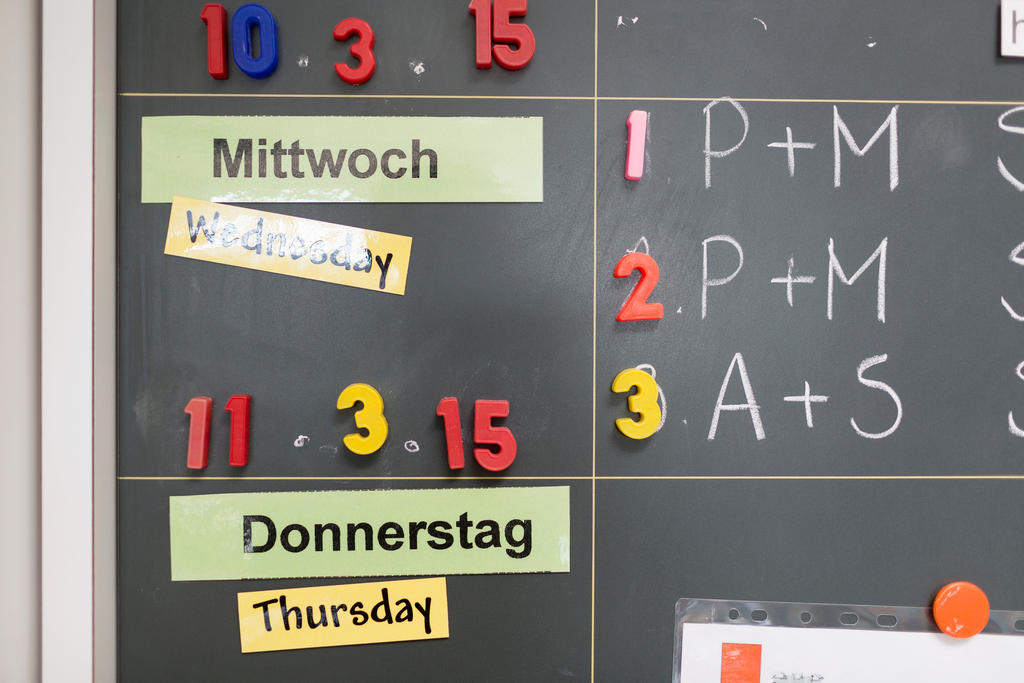Pressure to harmonise language teaching at school

The government is calling for increased efforts to streamline the teaching of national languages in Swiss schools. It presented plans in a bid to solve an ongoing controversy in several of the country’s 26 cantons spread over four language regions.
Interior Minister Alain Berset presented three options to break the deadlock, saying a common policy was key to strengthen the identity of a multilingual country.
He said the aim was to “help promote a structured debate with minimum interference by the federal government”, as the cantons have a large degree of autonomy on education issues.
The options put to a consultation among cantons, parties and other organisations range from general guidelines to detailed rules on the languages taught and at what age.
Trying to pre-empt criticism, Berset stressed the move was in line with the country’s constitution, granting the national government the right to impose its policy if the cantons can’t agree on a common stance.
“It is a clear signal to the cantons to take responsibility and implement the strategy adopted more than ten years ago to harmonise the syllabus,” he said at a news conference on Wednesday.
In response, the cantonal education directors warned against any attempt to undermine cantonal autonomy. They appealed for patience, respect and an objective debate on the issue.
Opposition
Opponents have warned of overburdening pupils with too many different languages at an early age. Other groups want to give priority to English as a first foreign language – to the detriment of the national languages.
In 2004, the cantonal educations directors created a national language strategy that said all cantons must teach two “foreign” languages in Swiss primary schools: English, and one Swiss national language of each canton’s choice.
Since then, the controversy over the teaching of additional languages during the nine years of compulsory schooling has been fuelled by opposition at both grassroots and parliamentary levels. People’s initiatives are underway in several cantons, and cases are also pending before the Federal Court.
Reaction
With the renewed pressure to harmonise from the federal government, the Swiss media on Thursday included many reactions, ranging from discomfort to frustration over the perceived threat to cantonal autonomy.
According to a syndicated editorial in the Tages-Anzeiger and Der Bund newspapers: “There has probably rarely been a weaker justification for central government action – and at the expense of children.”
These sentiments were echoed by Thurgau Education Director Monika Knill, who told the Neue Zürcher Zeitung newspaper that Berset’s plan constituted a “disproportionate step” by the government. She said she hoped that “the cantons and the education directors will vehemently oppose the intervention of the federal government in the sovereignty of the cantons”.
The French-language Le Temps describes the government plans as a “yellow card” to cantons refusing to toe the line. The editorial appeals to the cantons to act responsibly by implementing the common policy.
“It is up them to be creative and increase efforts to promote opportunities for language immersion and school exchanges,” the paper says.
The current language situation
German is the mother tongue of more than 60% of the population in Switzerland, while French is spoken at home by about 23% and Italian by 8%. Romansh accounts for less than 1%.
English is not an official language but it is also taught in some primary schools. There are concerns that English could become too dominant as a method of communication between the different linguistic groups.

In compliance with the JTI standards
More: SWI swissinfo.ch certified by the Journalism Trust Initiative













You can find an overview of ongoing debates with our journalists here . Please join us!
If you want to start a conversation about a topic raised in this article or want to report factual errors, email us at english@swissinfo.ch.